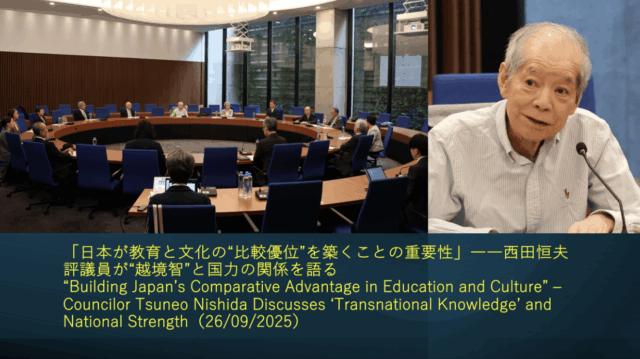
At the Council Meeting of the Kyoto International Peacebuilding Center, Mr. Tsuneo Nishida, Council Member of the Center and former Ambassador Extraordinary and Plenipotentiary of Japan to the United Nations, shared his perspective on “transnational knowledge,” comparative advantage, and the role of culture and education in strengthening Japan’s global presence.
Mr. Nishida began by referring to The World Is Flat (2005) by Thomas Friedman, noting that the book analyzed the progress of globalization mainly through the lens of industries and corporate activities. He explained that today’s discussion on “transnational knowledge” can be understood as an extension of that earlier discourse.
Looking back at the 20 years since the book’s publication, Nishida pointed to “the intensification of immigration issues” as one of the defining developments. He cited U.S. policies under the Trump administration—such as proposals to charge as much as 10 million yen for a work visa—as examples of “extreme nationalism and isolationism.” Since roughly 80% of H-1B visa holders were Indian engineers, Nishida observed that these measures effectively targeted India and strained U.S.–India relations. “Such nationalism is not a temporary phenomenon,” he warned, “but one that will likely persist worldwide.”
Turning to the relationship between transnational knowledge and education, Nishida argued that while international collaboration in research remains feasible, education faces greater challenges. “Students pursue education with employment in mind,” he noted, “so it is only natural for them to study where comparative advantage exists.” Ultimately, he said, “cross-border education is guided by comparative advantage. If Japan can establish a comparative advantage in education, it can certainly serve as a central hub for transnational knowledge.”
In a subsequent statement, Nishida reflected on his time as Director-General of Japan’s Economic Cooperation Bureau. “At that time, Japan’s ODA was the largest in the world, surpassing even that of the United States,” he recalled. During the global AIDS crisis, “leaders of international organizations and aid officials lined the corridors of the Ministry of Foreign Affairs seeking Japan’s assistance.”
From this experience, Nishida emphasized that “comparative advantage remains the key—not geopolitics.” He remarked, “If Tokyo possesses genuine appeal, people will naturally gravitate toward it. Ultimately, competition is about how much wealth, wisdom, and attractiveness a nation possesses.”
He concluded, “For Japan to stand at the center of the world map—even on a Mercator projection—enhancing national strength is essential. In this respect, art plays a vital role and should be recognized as one of the fundamental sources of national power.”
For other speakers’ statements and further details of the meeting, please click here.
(Reported by Koki IMON)
Original Speech (English Translation)
Tsuneo Nishida
Council Member, Kyoto International Peacebuilding Center
Former Ambassador Extraordinary and Plenipotentiary of Japan to the United Nations
Speech 1
Listening to today’s discussion reminded me of Thomas Friedman’s The World Is Flat, published in 2005, which examined the advance of globalization primarily in relation to industry and corporate activity. I understand the concept of “transnational knowledge” being discussed today as an extension of that idea.
Twenty years later, in 2025, one of the most significant developments has been the intensification of immigration issues. Under the Trump administration, for example, there were astonishing policies—such as proposals to require 10 million yen to obtain a work visa—reflecting extreme nationalism and isolationism. The mindset was: “Investments are welcome, but people are not; don’t interfere—America will take care of itself.” Incidentally, about 80% of those entering the U.S. on H-1B visas were Indian engineers, so this effectively targeted India. As relations with Prime Minister Modi deteriorated, the U.S. deliberately implemented measures that would irritate India. These concrete examples show that nationalism, not only in the U.S. but globally, has intensified—and I believe this is not temporary but a lasting trend.
From this standpoint, while “transnational knowledge” applies to both education and research, it is more difficult in the realm of education. Students pursue education with employment in mind, so naturally, they prefer to study in places with comparative advantage. Thus, cross-border education is guided by that advantage. In other words, if Japan can establish a comparative advantage in education, it is fully possible to construct a Japan-centered framework for transnational knowledge.
Speech 2
I agree with Ambassador Shinyo’s remarks, but I believe there is another perspective. During my tenure as Director-General of the Economic Cooperation Bureau, Japan’s Official Development Assistance (ODA) was the largest in the world, surpassing that of the United States.
At that time, the AIDS epidemic was spreading, and there was a desperate demand for funding. The corridor in front of the Bureau was lined daily with aid officials—including heads of international organizations—seeking Japan’s financial support. This is no exaggeration; it truly happened.
Therefore, though my wording differs slightly from earlier remarks, I believe that “comparative advantage” is of paramount importance. If Tokyo possesses genuine appeal, people will naturally gather there. I find the current popularity of geopolitical commentary somewhat misplaced. In the end, competition depends on how much wealth, intelligence, and attractiveness one’s own country possesses.
To place Japan at the center of a Mercator projection map, it is essential to strengthen the nation’s overall power. In this regard, the role of art is immensely significant—it should be recognized as a true source of national strength.




